- Home
- Michael Crichton
Odds On: A Novel Page 17
Odds On: A Novel Read online
Page 17
He handed them the rubber sacs and two pairs of nylon gloves. Miguel left the room. Bryan checked his watch, waiting out the thirty seconds before he, too, would leave.
“Get some sleep, Bryan,” Jencks said.
“You said that before,” Bryan said, smiling. “Better take your own advice. Big day tomorrow, and you’re in a position to lose some fingers.”
Jencks smiled too, remembering how busy his fingers had been that afternoon. Bryan left the room, and Jencks was alone with his thoughts. Jenny had been difficult when he had told her she couldn’t spend the night with him; she had been more difficult when he had been vague about meeting her the next day. But it couldn’t be helped. He shook his head. He was very tired. And Bryan was right. Tomorrow would be a big day.
SATURDAY MORNING, JUNE TWENTY-FIRST
JENCKS ROLLED OVER AND looked at his watch. It was 7 a.m. He could still get another hour of sleep if he wanted it, but he wasn’t sleepy. Nor, he reflected, was he tired. His excitement was fresh, without any hint of nervous tension. That was good. He climbed out of bed and went over to the timers—a pair of small aluminum boxes, each the size of a paperback book. He picked up one and slid back the cover, exposing the workings—two dials, and banks of button-shaped mercury batteries. One dial was a miniature galvanometer, which recorded the battery charge; the other was the face of an Omega wristwatch chronometer, extremely accurate, which provided the clockwork mechanism for the timers.
He wound the watch ahead by hand until contact was made. The galvanometer needle jumped. The device was in perfect working order. Rapidly, he ran through the same procedure with the second timer; again, the galvanometer indicated a satisfactory flow of current. But then, he thought it should. These timers were of his own design, made up by a little machine shop in Reno which specialized in odd jobs for hobbyists and amateur inventors. The owners of the shop hadn’t batted an eye when Jencks had presented them with his plans. He had explained that they were for his home toaster and coffee-maker—he wanted them to turn on automatically in the morning. The owners had praised the ingenuity of his designs and questioned the advisability of making a unit so small and accurate, since it raised the cost, but that was all.
Toast and coffee sounded good to him now. He dressed quickly, and went downstairs for breakfast.
Characteristically, Miguel arose and shaved without once considering the job he was going to begin. He had the ability to live entirely in the present, with no thought for the future, no fears and no imaginings. Besides, he had a miserable hangover which puffed his eyes and pounded his head. He had gotten quite drunk the night before, after the meeting broke up.
He cut himself shaving and swore loudly, releasing a torrent of profanity. It made him feel a little better; his head seemed to clear slightly. Encouraged, he lit his first cigarette of the day and stared at the bleary-eyed face in the mirror. A degenerate bastard, he thought, but not deteriorating yet. There were a few good years left. He dabbed at his cheek with the styptic pencil and swore again as the stinging began.
Bryan shifted uneasily in his bed. He was passing trucks on a highway, weaving in and out among them in a little green sports car. Each time he passed one, he sighed with relief, and felt happy that at last he had the road to himself. And as he came over each hill, there was another truck to be dealt with. His was the only car on the road; otherwise there were only trucks moving in both directions. As time went on, he grew exasperated with the tiresome routine of slowing down, peeping around the rear wheels of the truck, gauging the road ahead, and pulling out just as the truck changed gears and discharged a great stinking cloud of exhaust.
His exasperation led him to take chances. He began to pass on hills and curves. He began to cut things very fine, often just avoiding being crushed between an oncoming truck and the one he was passing. His safety margin decreased each time. Every new maneuver was more risky than the last; he wanted to stop, but he was compelled by his frustration at sitting behind the creeping trucks, breathing their black exhaust. And so he continued to pass, knowing that sooner or later there would be an accident. There always was.
He woke up sweating. It was the same dream he had had, off and on, for months now. It was the same each time he dreamed it, horrible and realistic. Shivering, he got up and went into the bathroom. He took a hot, soothing shower. By breakfast, he had forgotten all about the dream.
Miss Elizabeth Shaw hopped out of bed and walked briskly to the window. She stared up at the clouds and frowned. It really did not look like a good day. Not at all. Nasty dark clouds were forming to the east, and the sun seemed weak-willed and fluctuating. Undoubtedly, it would rain; the only question was when. She hoped the weather would hold until evening. All these people cooped up inside a hotel could be ghastly, and they would make a terrible racket. Rain never seemed to dampen anyone’s enthusiasm for making noise in hotel rooms. She sighed as she thought of the din the brats next door would raise. There were three of them, little French devils with cherubic faces and nimble, noise-making hands. And the walls of these new hotels were paper thin. Not like the good old days, when people made a building to last and to give a little privacy.
Still sighing, she began peeling a banana. Her supply was running low. She would have to see that charming girl about it.
“Jenny!”
Slowly, she opened her eyes.
“Where were you yesterday afternoon?”
“Oh, it’s you, Peter.” She burrowed under the pillow. Why couldn’t he leave her alone? He knew she hated to lock her door. He was taking advantage of her. Besides, she had had to leave it unlocked last night, in case Steve came to her in the middle of the night.
“I’m serious Jenny. Come out of there. I want to talk to you.”
“Go away,” she said, her voice muffled by the pillow.
“You keep saying that. Pretty soon,” he said, lowering his voice ominously, “I’ll do it. Where will you be then? In the arms of that gross disgusting boxer. I really don’t know what you see in him. He’s repulsive.”
Jenny brought her head out and looked at him. Her eyes were relaxed, almost bored. “Peter,” she said, yawning, “you are a jackass.”
He recoiled, as if slapped. “Well, if that’s the way you feel about it, I’ll leave. That’s all, just leave. Here and now. Goodbye.”
He stepped to the door. She watched him impassively. He was aware of a change in her, a new disturbing lack of interest in him. He didn’t seem to exist, for her. He stopped, his hand on the door. “Are you really serious?”
“Yes.” She stretched happily, acting as if he were already gone.
“How can you go for somebody like that? Somebody that coarse, and rough, and … and—”
“Peter,” she said, “he’s a man.”
He threw out his chest. “And I’m not?”
“No. Sorry.”
“Well then, the hell with you.”
He left, slamming the door behind him, but he still heard her laughter in his ears.
Smoking a fat cigar and trying not to gag on the smoke, Steven Jencks nodded politely to the girl at the desk, and stepped outside for his morning constitutional. By now, he knew, the staff of the hotel was accustomed to him; each morning he strode briskly out of the lobby and headed across the bridge, puffing on a particularly expensive and foul-smelling cigar. He would cause no comment today.
He crossed the bridge, hearing his feet make hollow sounds on the road. Thirty feet below, the water lapped and sucked at the jagged rocks. He glanced anxiously at the sky. Clouds hung low in the east, and the air had a damp, foreboding quality. Storms blew up quickly on the Costa Brava, even in summer, and he had taken that into account when doing his computer work. Using meteorological records for the past five years, he had determined that the chances were one in seven that the day of the robbery would be overcast; one in nine that it would be overcast and below seventy degrees; one in eleven that it would rain part of the day; one in fourteen that it would rain hard and continuously.
Those were chances that you had to take.
Jencks had checked weather reports for the day, and they predicted rain beginning early Sunday morning. That would be all right. In fact, it would be ideal.
He left the bridge and continued along the road, walking with a jaunty stride. As soon as he was out of sight of the hotel, he tossed aside his cigar with a grimace. They really were disgusting things. His eyes followed the telephone and electric lines which ran along the road. Two days earlier, he had spotted the perfect pole for his job. It was a good fifteen minutes from the hotel, set into the ground at the base of a wooded hill. Trees partially screened it from the road, and that was useful; it would not do for anyone to drive by and notice a tourist fiddling with the wires at the top of a telephone pole.
He reached the place and unbuckled his belt. It was an unusual belt, with holes for the buckle near the center, as well as at the tip. When he was wearing it, nobody would notice that it was actually twice as large as it should be. Using its full length, he passed it around the pole, and rebuckled the belt at the tip. Then he began to climb, getting a sufficient grip on the wood with his heavy crepe-soled shoes. The pole was rough hewn, like most in Spain, and not smooth like American telephone poles. That was to his advantage. He had packed a pair of light track shoes—field shoes, actually, with longer spikes—just in case, but his preliminary inspection on Tuesday had indicated that they would not be necessary.
It took only a few moments to shinny to the top. There were two cables, one for the seven telephone lines the hotel maintained, and the other for all the electric needs of the Reina. Both were held away from the wood by crude, heavy, ceramic insulators. He taped one charge around the two insulators, delicately fixed the blasting cap, and set the timer for 12:48. Then he taped the timer to the pole and attached it by the two wires to the blasting cap. After a final check to make sure that all the components were firmly in place, he slid down to the ground, freed his belt, and readjusted it around his waist.
He checked his watch. Nine minutes for the operation from start to finish. He had estimated eleven; it was nice to see that he had been overcautious. It was not twenty-five minutes since he had walked out of the hotel lobby. On previous days, he had been gone an average of fifty-five minutes. Plenty of time. He walked slowly back down the road.
A casual observer, watching from the hotel, would have seen Mr. Jencks returning with a happy smile on his face. He was obviously a man who liked the outdoors, who enjoyed “taking the air.” But he was also passionately interested in flowers; the doorman, for instance, had once engaged in quite a long conversation with Mr. Jencks on the varieties of wildflowers and when they blossomed. Mr. Jencks seemed quite knowledgeable, and there was no denying that he was observant. Always stopping to sniff a flower here and there, always noticing little things.
And so, it would not have surprised the doorman to see Mr. Jencks pause as he reached the bridge and look down toward the water with great interest. A few moments later, Mr. Jencks was scrambling down to the water; when he returned, he was carrying a bunch of blood-red poppies which he seemed very pleased with. The maid knew, if anyone cared to ask her, that Mr. Jencks always kept fresh flowers in his room. He was that kind of man.
Actually, Jencks had left a reddish-brown, earth-colored package from one of the inner pockets of his raincoat beneath the bridge. That had been his purpose in going down; he had picked the flowers as an afterthought.
He brandished them cheerfully before the doorman as he went inside. He found Alan Brady at the reception desk, checking out.
“Hi, baby,” Brady said. “How’s the boy?”
“Fine. Do I get your room now?”
“You know it. She’s all yours, and I hope you use it in good health. Hell of a bed,” he added.
Brady paid his bill, and walked with Jencks back out to the traffic circle. He noticed the flowers.
“What’re you doing with them?”
“Giving them to a girl.”
“That’s not all you’re giving her, I hope.” He laughed coarsely. Jencks was relieved to see he slapped his own knee this time, not Jencks’.
A car, a little Hillman convertible, pulled up in front of the door. The skinny man from Barcelona was driving. Jencks talked with Brady while the porter loaded the bags into the trunk. Then he stuck out his hand.
“Have a good trip,” Jencks said.
“Thanks, thanks. Enjoy the rest of your vacation, baby. And remember to eat regular—keeps your strength up for flower picking.”
With a final laugh, he got in the car, and the little man put it in gear. A last wave of a heavy red hand, and they were gone, across the bridge, out of sight.
Jencks went back inside to the desk, and noticed that the receptionist was looking unusually radiant. He’d have to mention that to Bryan.
“I would like to rent an aqualung,” he said.
“Yes, of course. Would you like it now?”
“After lunch, I think. Say about two, when I’ve given my food a fighting chance. Can that be managed?”
“It will be ready at the sea-bathing pier.”
“Where the sign is?”
“That’s right. You want the regulator as well as the tank?”
“The whole works.” He watched her record his name and the time on a slip of paper, and drop it onto a pile of outgoing messages. “Thanks very much.”
“Don’t mention it.”
Still carrying his poppies, he stepped into the elevator and went to his room. Once there, he threw out yesterday’s flowers and put the new bunch into the glass which he used as a vase. They added a pleasant touch of color to the light gray neutrality of the room, he thought, as he stepped back to survey them. Jencks felt extra little touches were important.
Peter looked up and saw Jencks enter the dining room and sit at a table at the far end of the room.
“I just don’t see it,” he said under his breath. She was a bitch, he thought. She had never intended to sleep with him; she just enjoyed tormenting him. That was why she had chosen the ugliest man in the hotel to go to bed with. It was a deliberate, carefully planned insult.
The hell with her.
He watched as Jencks gave his order and then got up to go to the buffet table of hors d’oeuvres. He moved like a jock, Peter thought, a hulking insensitive chunk of meat. Three jocks lived in his entry at Eliot House—big loutish football jocks, all of them practically on probation, who drank beer every night and fingered adoring girls and took gut courses in Social Relations. Everyone knew that Social Relations was the jock field; the courses were geared to their brains.
And the girls. The way those girls would scream and giggle at the parties, the way they would throw themselves at a guy just because he trotted around with a big number on his back. Peter just didn’t see it, himself.
It was hero worship, that’s all, a quirk of the culture, that made brutes more attractive. The more beat-up, the more cuts on their faces and cleat marks on their shins, the better the girls liked it. It was unnatural.
Jencks returned to his table with a plate of appetizers, and Peter’s attention shifted to the Spick who had entered the dining room. What was his name? Mickey, or something like that.
Peter couldn’t be sure he was a Spick, but he certainly looked it, with his slightly oily dark skin and dark hair. And there was something Latin about his features, too.
He recalled the girl that the Spick had introduced him to, the one who had fallen asleep while he was explaining the thesis he planned to write on mysticism in George Eliot. She looked like a Spick, too, though he had to admit she excited him. He would have willingly planked her, if she hadn’t fallen asleep. That had been too much. Every man had his pride, Peter thought, pouring himself another glass of wine.
He decided, quite suddenly, that he would leave Jenny.
He would leave tomorrow, in the morning, and not even call her before he went. If she wanted to find him, she could get herself to Barcelona and look hi
m up there. And maybe he’d be nice to her when she arrived. Maybe.
In his mind, he created a poignant, slightly sadistic and very satisfactory reunion scene. When he was finished with her, she was dissolved in tears.
AFTERNOON, JUNE TWENTY-FIRST
JENCKS GRUNTED AS HE slipped the heavy cold tank on his back. The crew-cut, blond American who acted as lifeguard, beachboy, and propman looked concerned. “Too tight around the shoulders?”
“I think so,” Jencks said.
“Tilt your head back. Can you feel the regulator? Yes, you touch it. I’ll set the tank lower.” He adjusted the straps so that the pressurized cylinder rested farther down on Jencks’ spine. Again, Jencks leaned his head back, but this time did not feel the metal of the regulator against the base of his skull.
“You’re okay now,” the American said. He flipped the hoses over Jencks’ shoulders, so the mouthpiece rested on his chest. Then he pointed to the remaining canvas straps hanging down from the tank harness. “That goes around your waist, and hooks to the third strap which passes under your crotch. Make it as tight as is comfortable. I’ll get you a weight belt.” He looked at Jencks critically. “You float easily?”
“I sink like a stone.”
The American nodded. Jencks’ big frame was all muscle, no fat. “I’ll just get you enough to overcome the buoyancy of the tank. What’s your shoe size?”
“Eleven.”
He returned with a belt, a mask, and a pair of flippers. “Dip your feet in the water and try these.” Jencks did; they fit. He took the mask, rinsed it in the water, then spit into it and rubbed the saliva over the inside surface of the glass. That prevented condensation and fogging. He rinsed the mask again and pulled it over his eyes and nose. The rubber strap tugged against his hair.
He placed the mouthpiece between his teeth and tasted hot rubber. The American reached behind Jencks and turned on the air. There was a momentary hiss as the regulator adjusted; then Jencks took a few experimental breaths. The air was cool, clean, and dry.

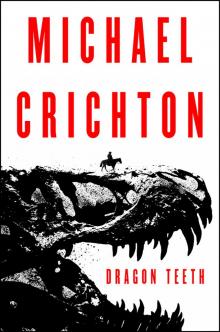 Dragon Teeth
Dragon Teeth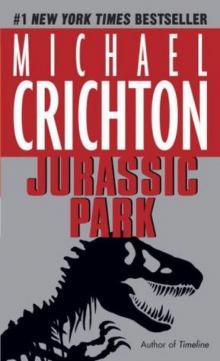 Jurassic Park
Jurassic Park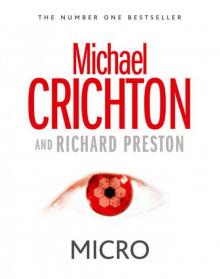 Micro
Micro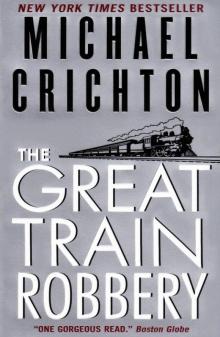 The Great Train Robbery
The Great Train Robbery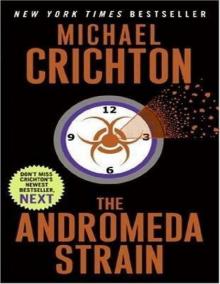 The Andromeda Strain
The Andromeda Strain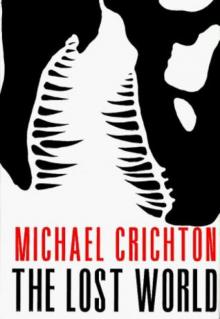 The Lost World
The Lost World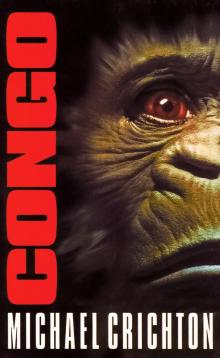 Congo
Congo Travels
Travels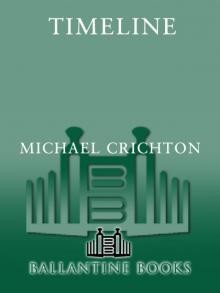 Timeline
Timeline Sphere
Sphere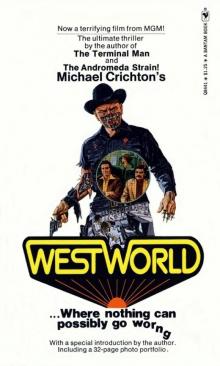 Westworld
Westworld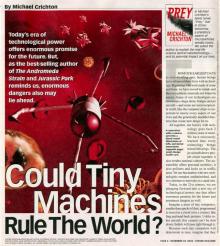 Prey
Prey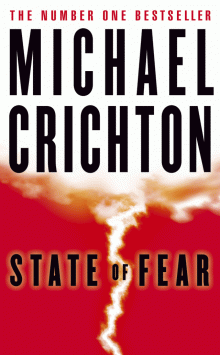 State Of Fear
State Of Fear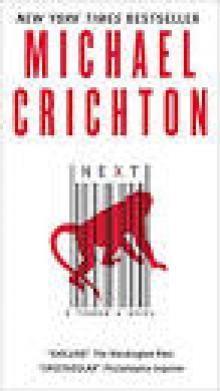 Next
Next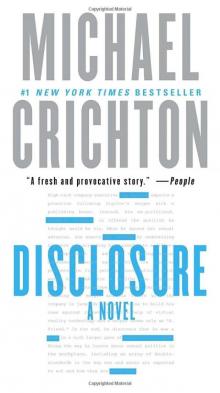 Disclosure
Disclosure Pirate Latitudes
Pirate Latitudes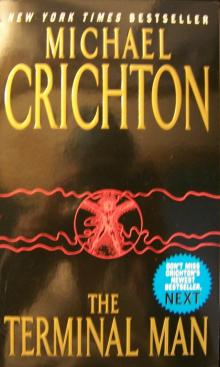 The Terminal Man
The Terminal Man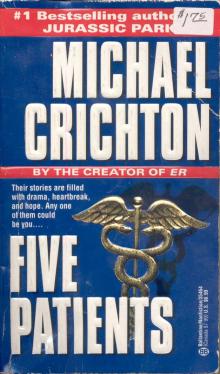 Five Patients
Five Patients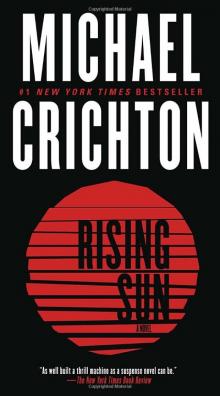 Rising Sun
Rising Sun Binary
Binary The Andromeda Evolution
The Andromeda Evolution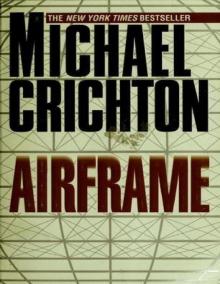 Airframe
Airframe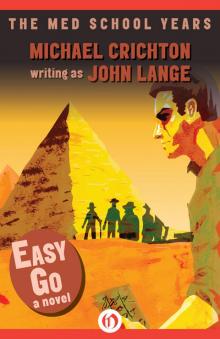 Easy Go
Easy Go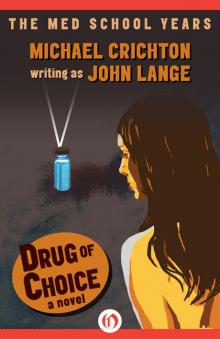 Drug of Choice
Drug of Choice Odds On: A Novel
Odds On: A Novel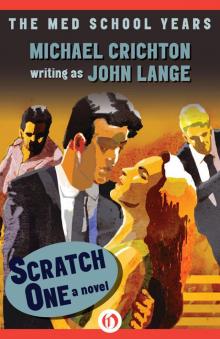 Scratch One
Scratch One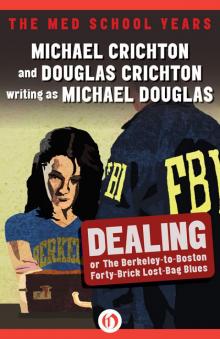 Dealing or The Berkeley-to-Boston Forty-Brick Lost-Bag Blues
Dealing or The Berkeley-to-Boston Forty-Brick Lost-Bag Blues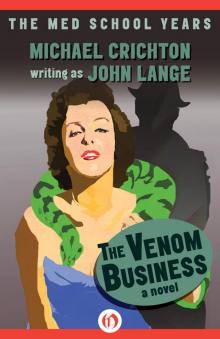 Venom Business
Venom Business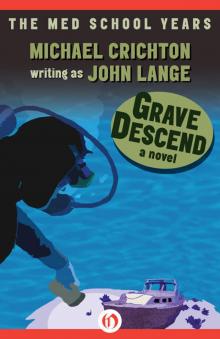 Grave Descend
Grave Descend Gold - Pirate Latitudes
Gold - Pirate Latitudes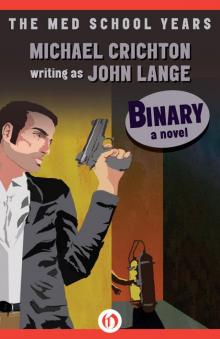 Binary: A Novel
Binary: A Novel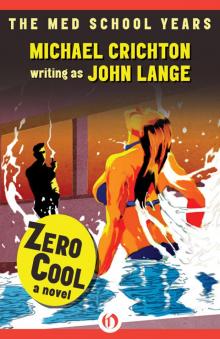 Zero Cool
Zero Cool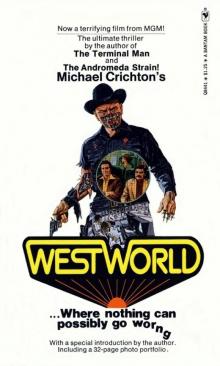 Delos 1 - Westworld
Delos 1 - Westworld